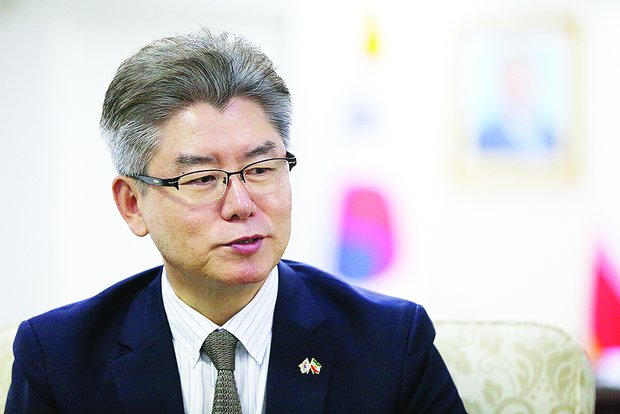The comments by Ambassador Ryu follows contributions - $2.2 million in August and $6 million in October - to Afghan refugees in Iran.
Seoul’s top diplomat to Tehran also says the Republic of Korea has turned from a recipient country during the 1950-53 Korean War to a donor country in the present day.
“I think Korea is a very typical case and good example to become a donor country from a recipient country,” Ryu tells the Tehran Times.
Following is the text of the interview:
The Republic of Korea made a $2.2 million multi-year contribution to the United Nations World Food Programme (WFP) to support 30,000 of the most vulnerable Afghan refugees [as1] in Iran in late August. Also on October 15, Korea made another $6m help to the UNHCR. What’s the motivation behind the generous contribution to the refugees in Iran?
Recently we made that contribution to UNHCR, one of the leading humanitarian organizations in the world, and also previously we made the similar contribution to the World Food Programme. Those two contributions are related to Afghan refugees in Iran.
Disasters and regional confrontations made problems, including problems of refugees and humanitarian issues which cannot be resolved by a single country. During this time, the Iranian government have been doing a great thing successfully, addressing the issues, but also as a close partner of Iran, Korea has decided to help the international organizations and make contribution to help solve the issues through cooperation with the Iranian government.
The stability of the region is inevitable for economic prosperity. I think supporting and providing assistance to vulnerable people is very important, and as you know the Korean government suffered from food shortage and lots of problems in the 1950s after the Korean War. After that we developed rapidly through the assistance from the global community, and now Korea is the 11th largest economy in the world and we never forget what we received from our neighbors, and this time we want to repay to the people in need together with some of the host countries like the Iranian government. So, I hope, as the ambassador of Korea, to help people together with Iranian government.
What is your suggestions to other countries in helping Iran to cope with the refugees?
Iran has been doing a great job. As I understand every country has some kind of domestic problems and external problems. Iran has been suffering from those problems too, but the Iranian government has adopted very generous policies towards refugees from the neighboring countries.
Through the generosity of the Iranian government, the regional situation became much better, and, as I mentioned before, those issues are not the problem of a certain country; they are definitely the matter of the region and the world. The whole world should be responsible for them. To my knowledge, not only Korea but also some other rich countries including Japan, some European countries and the US are contributing and donating for people in need, but I think Korea is a very typical case and good example to become a donor country from a recipient country.
We understand better than any other countries how the international countries’ assistance is critical for the refugees and the people in need, so maybe Korea is not a big country but we want to be a good example to show a successful story to the other countries and we will continue and I will once again express our government’s commitment to continue our contribution to refugees.
Can Korea provide vocational training to Afghan refugees to make them financially independent?
I’m not an expert in the kind of refugees’ issues but on the basis of my job I was once assigned to Geneva at the time I was in charge of the UNHCR refugee issues as well as other humanitarian organizations. At the first stage what is important is providing food and shelter for the refugees but maybe after settling down the second phase is to provide the ability to continue their lives. So for this purpose we provide them with vocational trainings and job skills which are really important for them to make a living independently.
So maybe through the KOIKA [Korea International Cooperation Agency] and other ODA [Official development assistance] organizations the Korean government is providing some programs one of them is a vocational training program and also some schooling and other capacity building programs.
MNA/TT

























Your Comment